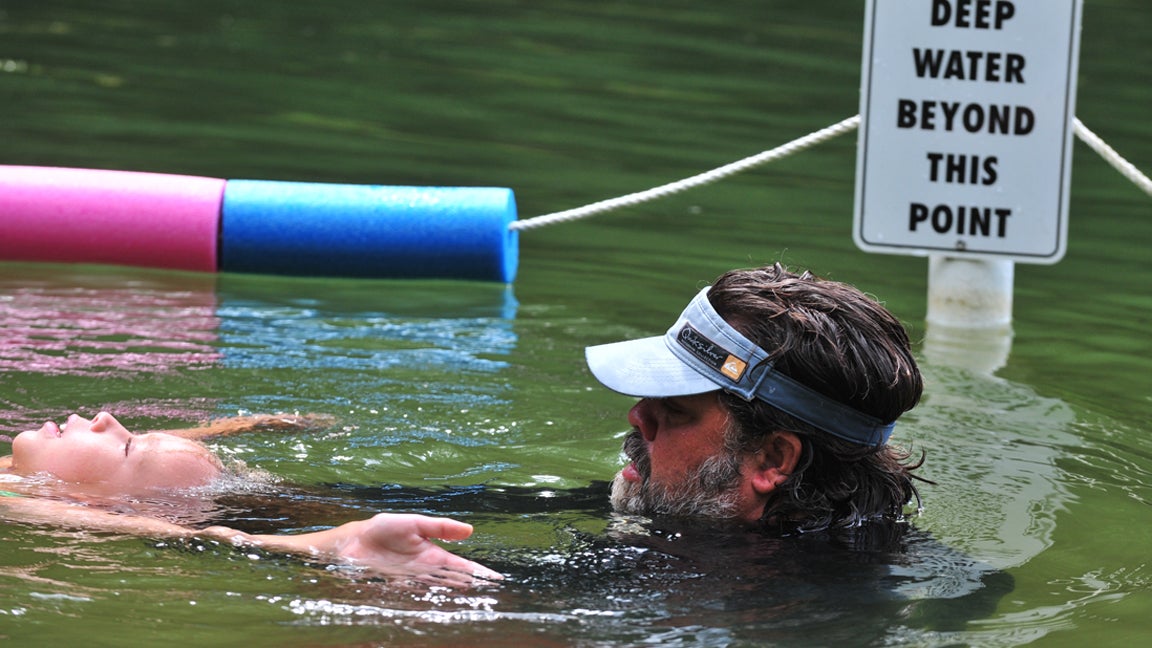Free swim lessons at Twin Lakes build safety and self-confidence
Published 9:33 pm Friday, July 1, 2016
By Mark Schmerling
During the weeks of June 20-24 and June 27-July 1, young boys and girls, many of whom arrived for their first-ever swim lessons, often went from being afraid to put their faces in the water, to floating, turning calmly and confidently in the water, and swimming longer distances than they would have thought possible.
This was part of Saluda Community Land Trust’s free swim lessons at the group’s Twin Lakes Park facility, just outside Saluda.
A grant from the Polk County Community Foundation paid all costs for lessons to children from 10 months through 13 years old, and from all social and economic backgrounds.
These youngsters were in the capable, encouraging hands of Brian Lilburn, who, 15 years ago with longtime friend Scotty Launer, began Aquachild Aquatic Enrichment Program, a program to help give children confidence in the water, and help them survive potentially dangerous situations, through encouragement, repetition and positive reinforcement.
In Florida, the two men learned of a woman who taught non-Red Cross, but effective swim techniques in a backyard pool. The woman had learned from Joy McGinty, whose influence inspired Lilburn and Launer to begin the Aquachild Aquatic Enrichment Program some 15 years ago.
Lilburn is the stepson of David Prudhomme, who has devoted much energy in recent years to SCLT. That connection got him to Saluda for the lessons.
At Twin Lakes Park, Lilburn was generous with both his time, and with the encouragement.
“Good job, mermaid,” he told one young girl who relaxed and propelled herself. “You are a superstar swimmer.”
Lilburn’s early experience in a pool was an all-too-familiar one, but with positive long-term results.
“At the age of two I almost drowned in a backyard pool. My mom and her friends were sitting at a table by the shallow end as I was racing around the pool. I fell in, bumped my head, and before anyone could react, I was at the bottom in the deep end.”
“By the time they got me out,” Lilburn added, “I had swallowed a lot of water, so they rushed me to the emergency room to pump my stomach. The next day, my mom brought me back to the same pool, and got me in. She followed up by putting me in swim lessons. My mom would not let this experience be the defining one. This led me on the waterlogged path I’m on today.”
Lilburn studied underwater archeology at Florida State University. In 2001, after 200 hours of hands-on training, Launer and Lilburn started Aquachild.
When they began Aquachild, Lilburn was working as a bartender, and not liking it. But, as Aquachild grew, his workdays at the bar became fewer, until he could finally leave that part of his life behind.
The best day of his life, he said, was when he no longer had to bartend. It changed his life and how he raised his own young children, Pixie and Raiden.
“It’s really been a boon training my kids. I love what I do. It’s rewarding,” he said.
Aquachild’s goals are simple. Use repetition, gentle encouragement and positive re-enforcement to help youngsters be comfortable in the water, and get themselves out of potential danger. Children are encouraged, but not forced. Relaxation is one of the keys. Splashing and other extra energy expenditure is counter-productive to that.
“We’re trying to make it as far as possible, with the least amount of energy,” Lilburn explained. He mentioned that during the second week of instruction, one youngster swam all the way across the lake, without fear.
“It’s awesome to see that,” Lilburn said. “When they get it, they get it.”
Those young boys and girls who have taken the lessons have not only learned basic life-saving skills, but are on paths of self-confidence in all aspects of life.
“It’s great for their self-confidence,” Lilburn echoed. “It’s awesome to see that.”
Lessons were only ten minutes each (in deference to youngsters’ attention spans and other factors), but were totally one-on-one. Some children took lessons twice each day, for the two weeks, a testament both to the program, and to their parents or other relatives who invested the time to get them to the lake repeatedly. Lessons had to be at least three hours apart.
“I am so impressed,” said SCLT volunteer Amy Wood. “I am floored with this program.” Wood noted that of all the positive uses of the Twin Lakes facility, this one ranks as the highest and best use—to bring this caliber of instruction—and real life insurance and life-changing experience—to children from all economic and social backgrounds.
Lilburn said there was a lot of response to the offer of free swim lessons, and that he wanted everyone to get the most out of it.
Marci Cannon was all enthusiasm for the program.
“I, like all the other parents, have been amazed at the effective teaching of Brian of Aquachild. My three children have taken a session or two of swim lessons in the past from other organizations. My 10-year-old became very comfortable with swimming underwater but simply could not float on his back! After the first 10-minute session with Brian, he had learned to float on his back. My 8 and 6-year-olds were not comfortable putting their faces underwater before they started lessons with Brian. At the end of the first 10-minute session they were swimming with their heads underwater and floating on their backs. Each subsequent lesson has helped them improve their forward swim and back float.”
“Before these lessons I felt nervous while my kids swam,” she continued. “Now, I feel confident as they play in the water. All my kids are confident as they swim in the water, under the water and float on their backs. It is amazing! My family is very grateful to the people who made these swim lessons possible!”
It’s very rewarding,” Lilburn noted. “I know they are going to have a blast . . . and self-confidence. Watching them have fun with their parents – that’s the payoff.”






